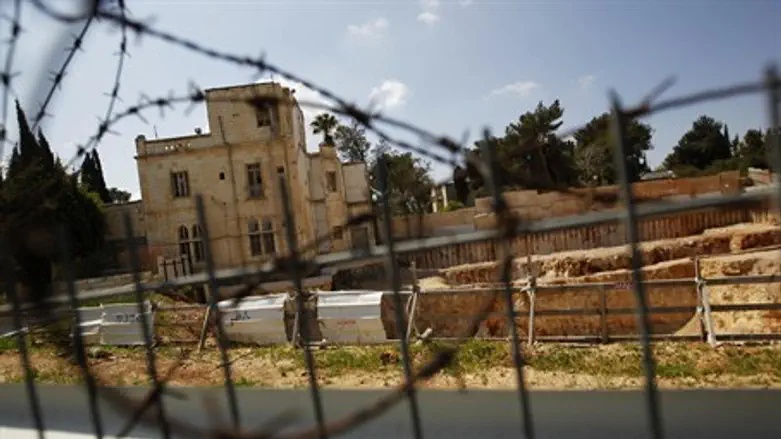
The Knesset's Sub-Committee for affairs in Judea and Samaria Issues held a meeting on Tuesday, on the topic of shared public transportation between Israelis and local Arabs in Samaria.
An order by the IDF's Central Command and Civil Administration in April 2013 enabled tens of thousands of Palestinian Arab workers, including undocumented workers, to use Samaria's public transportation along with Jews living in the region.
Residents complain that Samarian Arabs crowd the buses every afternoon, leaving no room for the Jewish population. Those Jews who do manage to get on the buses report sexual harassment and physical abuse.
The situation has led to demonstrations against the transportation ministry, and campaigns against Likud over the perceived responsibility of Likud members Transportation Minister Yisrael Katz and Deputy Transportation Minister Tzipi Hotovely.
Chairman of the Committee and IDF Colonel (res.) MK Moti Yogev (Jewish Home) spoke at the meeting.
"The fact that (Central Command) general (Nitzan Alon) didn't solve the problem, shows the Central Command's lack of involvement, while they worry about Palestinian workers and undocumented workers, before the worry of residents returning to their homes," remarked Yogev.
Yogev noted that the Central Command and Civil Administration, who are responsible for Judea and Samaria, "have ignored this problem that they created for months, and still haven't found a solution for thousands of civilians who are harmed, the elderly, youth and children and weaker populations that don't have a private car."
'If the passenger didn't know Arabic, the Jewish woman would have been kidnapped'
Ariel Mayor Eli Shaviro recounted a recent incident on one of the bus lines, in which "a number of Palestinians talked among themselves in Arabic about kidnapping a Jewish woman on the bus. To her good luck a guy who understood Arabic was sitting there and called the police, who arrested them."
"What would have happened if that man on the bus didn't understand Arabic?" asked Shaviro. "A security breach tempts thievery, there are more Palestinians than Israelis [on the buses] and there is a great temptation to steal a weapon from soldiers. From a security perspective I warn that there is a great breach here."
Shaviro warned "this phenomenon also encourages undocumented workers to go to work illegally, because now they have means to return...every Arab resident has the right to go and return from work but that doesn't have to harm the security of residents."
MK Moshe Feiglin (Likud Beytenu), a resident of Karnei Shomron in Samaria, announced at the meeting that he doesn't allow his children to ride buses due to the new law, and is forced to pay for private transportation.
The new arrangement allowing local Arabs to ride buses "started with yowling over 'apartheid,' with a comparison to blacks in South Africa...this demagoguery caused the separate lines to be cancelled," remarked Feiglin.
Feiglin added that "the idea is to stop being afraid of the demagogues of (leftist newspaper) 'Haaretz,' we must separate the populations. You can't pay for bullet-proof armored buses against Palestinians, and then push the Palestinians onto the bus."
"Also financially, these buses are subsidized," noted Feiglin. "The subsidization is for Arabs and not for Jews...if the problem is undocumented workers we need to place security in every bus to check Palestinians like at coffee shops - the danger on buses is higher than at coffee shops."
Yigal Lahav, head of the Karnei Shomron Council, claimed there has been no progress since the last discussion on the topic in November.
'The situation is getting worse'
"The situation is even worse - thefts of bags from the storage compartment, sexual harassment, violence," reported Lahav. "The second a soldier stands there his life is in danger. This pressure cooker is about to explode. People already don't want to come live with us due to the fear."
Lahav added that in the previous discussion he "warned that this will lead to murder, and a day later the soldier Eden Atias (Hy''d) was murdered in Afula. What are we waiting for?"
In response to the charges, Yogev remarked that Transportation Minister Katz had added to the budget 43 million shekels ($12.3 million) to relieve the overcrowding on the buses.
Yogev added that Defense Minister Moshe Ya'alon also ordered solutions for the problem of "Palestinian workers returning at the Eyal passage, which prevents returning on roads crossing Samaria." He called the route "a free passage that encourages thousands of undocumented workers to go work in communities over the green line on different roads and return on the main road in buses for the public transportation of Jewish communities."
The committee demanded that General Alon implement a solution to allow safe transportation for Jewish residents, calling on him to deal with the thousands of undocumented workers. Yogev called for a follow-up committee meeting in another month and a half.
"As part of the struggle against the phenomenon of undocumented workers' entrance, and following the murder of the soldier Eden Atias on a bus in Afula, I am advancing a bill to make the punishment of those providing aid, work and lodging to undocumented workers more severe, and it will be voted on at a ministerial committee in the near future," added Yogev.